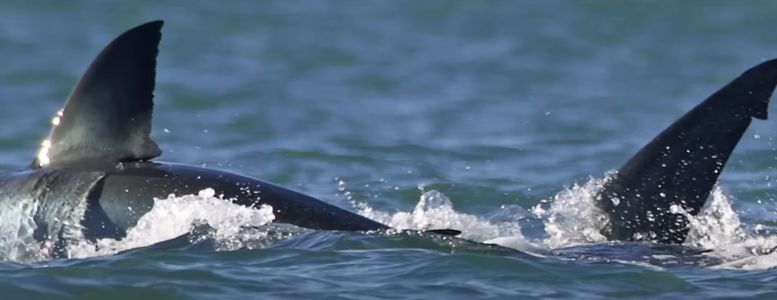 Orcas attacking and killing sharks, even great white sharks, off the coast of South Africa is nothing new. A year ago, a pair of orcas killed 17 sharks in one day in South Africa’s Pearly Bay. More recently, scientists were stunned to observe video footage of a solitary orca hunting, killing, and eating the liver of a great white shark, in an “astonishing” attack that took place in less than two minutes. Scientists said it was “unprecedented” and showed the exceptional predatory skills of killer whales.
Orcas attacking and killing sharks, even great white sharks, off the coast of South Africa is nothing new. A year ago, a pair of orcas killed 17 sharks in one day in South Africa’s Pearly Bay. More recently, scientists were stunned to observe video footage of a solitary orca hunting, killing, and eating the liver of a great white shark, in an “astonishing” attack that took place in less than two minutes. Scientists said it was “unprecedented” and showed the exceptional predatory skills of killer whales.
“It’s interesting that it’s just one animal,” Dr Luke Rendell, marine mammal scientist, from the University of St Andrews told BBC News, and how much skill it demonstrates in tackling the shark – ramming it in the side and grabbing the pectoral fin to keep away from those big, nasty jaws.
“A great white shark is a nice, big concentration of food, so it’s perhaps unsurprising that some populations [of orcas], where these sharks occur in sufficient numbers, have learned to exploit that.”
But why do the orcas rip out and devour the shark’s liver and leave the rest of the carcass? According to Ralph Watson, a marine biologist at South Africa’s Dyer Island Conservation Trust, livers make up about a third of sharks’ body weight and are rich in a nutritious oil called squalene, making them highly appealing to orcas, Watson says. “Rough calculations suggest a single white shark liver might sustain a single orca for a day,” he explained to Scientific American magazine.
Killer whale hunts and eats great white shark
Thanks to Alaric Bond for contributing to this post.
